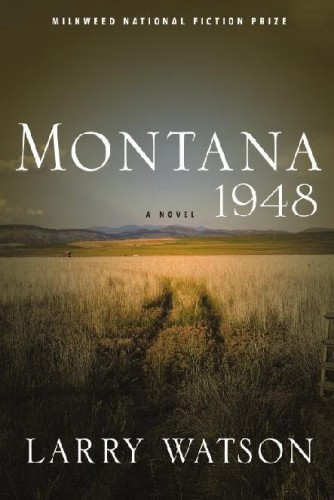
Montana 1948
A Novel
فرمت کتاب
ebook
تاریخ انتشار
2010
Lexile Score
880
Reading Level
4-5
ATOS
5.5
Interest Level
9-12(UG)
نویسنده
Larry Watsonناشر
Milkweed Editionsشابک
9781571318039
کتاب های مرتبط
- اطلاعات
- نقد و بررسی
- دیدگاه کاربران
نقد و بررسی

August 30, 1993
A stark tragedy unfolds in Watson's taut, memorable novel, the winner of the publisher's National Fiction Prize. During the summer of 1948, a solid, middle-class family in a small Montana town is wrenched apart by scandal, murder and suicide. Narrator David Hayden tells the story as an adult looking back at the traumatic events that scarred yet matured him when he was 12. His pious Lutheran mother informs his father, Wesley, the county sheriff, that David's uncle Frank, a doctor, has been molesting and raping Native American girls during routine medical exams. Uncle Frank's latest victim is Marie Little Soldier, the Haydens' Sioux housekeeper. When Marie dies, presumably of pneumonia, David provides key evidence that implicates his uncle in her murder. Frank is arrested by his brother, who locks the confessed sexual abuser in the basement to save him from the embarrassment of jail. David confronts his uncle's racism and the evasions and denials his family has constructed to cover up the affair. In crisp, restrained prose, Watson ( In a Dark Time ) indelibly portrays the moral dilemma of a family torn between justice and loyalty; by implication, he also illuminates some dark corners of our national history.

September 15, 1993
A young Sioux woman tossing with fever on a cot; a father begging his wife for help; a mother standing uncertainly in her kitchen with a 12-gauge shotgun: from these fragments of memory, evoked by the narrator as the novel opens, Watson builds a simple but powerful tale. It is Montana in 1948, and young David Hayden's father, Wesley, is sheriff of their small town--a position he inherited from his domineering father. Wesley is overshadowed by his older brother, Frank, a war hero who is now the town doctor. When Marie, the Sioux woman who works for the Haydens, fall ill, she adamantly resists being examined by Frank. Some probing reveals that Frank has been molesting the Indian women in his care. Wesley's dilemma--should he turn in his own brother?--is intensified when Marie is found dead and David confesses that he saw his uncle near the house before she died. The moral issues, and the consequences of following one's conscience, are made painfully evident here. Watson is to be congratulated for the honesty of his writing and the purity of his prose. Highly recommended.-- Barbara Hoffert, "Library Journal"
Copyright 1993 Library Journal, LLC Used with permission.

Starred review from September 1, 1993
The relationship of landscape to personality is a familiar theme, especially in western literature, but it may never have been explored with as much sensitivity and as fine an eye for detail as Watson manages in this stunning coming-of-age novel, the winner of the 1993 Milkweed National Fiction Prize.The "harshness of the land and the flattening effect of the wind" made life hard in Mercer County, Montana, in 1948, "so much so that nothing was left over for raising hell or making trouble." Well, maybe a little something, as the shocking events of David Watson's twelfth summer reveal: his father, the sheriff of Bentrock, Montana, forced to accuse David's Uncle Frank, a war hero and physician, of molesting numerous Indian women and murdering one of them, David's family's housekeeper; Frank's subsequent jailing, not in the city jail but in David's basement; and, finally, Frank's suicide, his body found by David's father: "Then my father's tears broke loose, one more briny fluid to mingle on the basement floor."The action unfolds circuitously, as David remembers how he pieced together what was happening, mostly through eavesdropping (an activity at which every only child excels). Yes, the novel is a kind of thriller and certainly a page turner, but, moreover, it is a quiet, almost meditative reflection on the hopelessly complex issue of doing the right thing--and on the courage it takes to face one's demons: "The shock of hearing this about Uncle Frank was doubled because my mother was saying these words. "Rape. Breasts. Penis." These were words I never heard my mother use--never . . ." The unspoken life of any small town, especially a small, hardscrabble western town, contains a motherlode of raw emotion, morally ambiguous and potentially devastating. Watson mines that vein with both unflinching honesty and complete respect, both for the dignity of the people and the implacability of the landscape. Inevitably, this spare, poetic novel will be compared with Norman Maclean's "A River Runs through It"; the comparison is apt on some levels--both explore the effect of cataclysmic events on naturally reticent people--but Watson deserves his own space under Montana's Big Sky. ((Reviewed Sept. 1, 1993))(Reprinted with permission of Booklist, copyright 1993, American Library Association.)

























دیدگاه کاربران